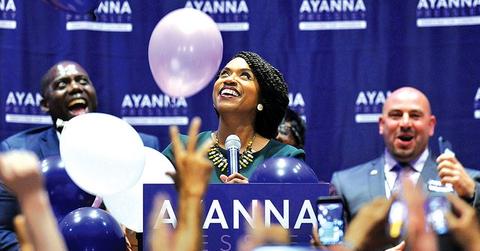The Base Must Become The Face: Black Women And The Democratic Party

On November 6th, 45 Black women are seeking a seat in the 116th Congress, 1 Black woman is running for Governor, and several Black women are on the ballots for statehouses across the country. Find a full list of those candidates here. Make sure your voter registration is active. Show up for Black women as Black women show up for the rest of the world.
“At present, our country needs [Black] women’s idealism and determination perhaps in politics than anywhere else.”– Shirley Chisolm, First African American U.S. Congresswoman and African-American woman candidate for the President of the United States.
Overlooked from the beginning
The pages of American history books tell a story about the after-effect of Congress passing the Voting Rights Act of 1964. Immediately, an influx of new African-American voters took up their civic duty and joined forces with the Democratic party, henceforward referred to as ‘the Party’. After the major legislation became the law of the land, first-time African-American voters throughout the South overwhelmingly supported Democratic candidates across the spectrum. Although history is still being written in 2018, the story still shows the Black community’s unwavering loyalty to the Democratic party in every election of the 21stcentury. However, there are many parts left out of the story about the Democratic party. And the one of most concern this election season is the Party’s continued practice of doubt in the demographic that is said to be keeping the party standing strong: Black women.
To Black women, this sentiment dates back to the 1964 Democratic National Convention, when Fannie Lou Hamer, a pillar in the Civil Rights Movement, and a co-founder of the Mississippi Freedom Democratic Party (MFDP), made a case before the Credentials Committee as to why she had every right to replace the white-male delegates that represented Mississippi. Here, her qualifications and leadership abilities were disregarded on two fronts. For one, the Democratic Party’s leadership proposed she wait until 1968 to become a full voting member of the delegation, as well as Democratic President Lyndon Johnson’s press diversion move from Ms. Hamer’s live-broadcasted testimony to his impromptu news conference.
Hailed as the Party’s ‘backbone,’ Black women have overwhelmingly voted Democrat since the 1990’s. It was Black women who attempted to save the 2016 election with 94% voting for Hillary Clinton. Most recently in 2017, Black women were pivotal in turning the historically Republican state of Alabama blue during the special Senate election of Doug Jones by voting for Jones at a 98% rate. In the same token, there has also been a trend of Black women not holding elected office. Yet, in An Analysis of Black Women’s Electoral Strength in the Era of Fractured Politics written by Andre M. Perry and supported by the Brookings Institution and Higher Heights Leadership Fund, only 3.5% of Black women made -up federal and state elected offices. Since the 1960’s there have only been 44 African-American women in the House of Representative and one has been elected a United States Senator. Black women have been showing up for election day for everyone else except themselves.
Today, Black women who stand on the shoulders of Ms. Hamer’s courage are seeking roles across every level of the political paradigm; and they too are challenged with overcoming the lack of support from the very Party they stand proud to represent.
Black women need money to win
It takes financial capital to run a successful campaign. Whether it be grassroots donations or large PAC funds, money is a significant factor. Normally, when someone announces their candidacy or interest in a political office, they are expected to rely on their network for financial support to begin the race. Where a candidate may lack, the party of affiliation, on the local, state, or national level, is supposed to step in and fill in the gaps. Because of the uneven distribution of wealth in this country, many Black women run into a major roadblock of not having access to a community with the financial resources to fund their political ambitions. This leads to a Black woman’s viability as a candidate comes into question and if the Party sees no potential for them winning, it is as if they are abandoned to figure it out on their own.
Under the Party sits the Democratic Congressional Campaign Committee (DCCC), whose sole mission is to back Democratic candidates running for seats in the House of Representatives. They develop a list known as ‘From Red to Blue’, which includes those who are running in historically Republican Districts and pour resources and support into their races. Of the 70+ Black women on a primary ballot, many of whom were in historically Republican districts, only one was named on the coveted list.
In addition to money, an understanding of the political landscape also plays a role. As Andre Perry articulated in the analysis mentioned above, “Black women are often challenged to find the type of culturally relevant candidate training that can help them translate their experience into effective campaign strategies.”
Many of the Black women who ran in the primaries were first-time candidates and that comes with a learning curve that must be overcome quickly. If the Party does not make itself available to assist, then those candidates are left once again to figure out the game without knowing all of the rules. Thankfully, several organizations such as Higher Heights, She the People, The Collective PAC, and Vote Run Lead, have committed to fill in those gaps and train Black women to run campaigns and become candidates and politicians.
The Democratic Party’s new strategy must include Black Women
There are conversations happening about the restructuring the role of Black women in the Democratic Party, but it will take more than just a conversation or a touring panel. Real introspection and action must take place for a real shift to take place. As Black women become more politically astute on the leadership side, the pivotal role they’ve played in the electoral process as the voter registrars, poll watchers, canvassers, election day chauffeurs will only be enhanced. What the Democratic party must now decide in their strategies moving forward, is whether they will return the favor to its most loyal voting block. If not, it’s plausible the house of the Democratic Party is at risk of crumbling without a sturdy base.





